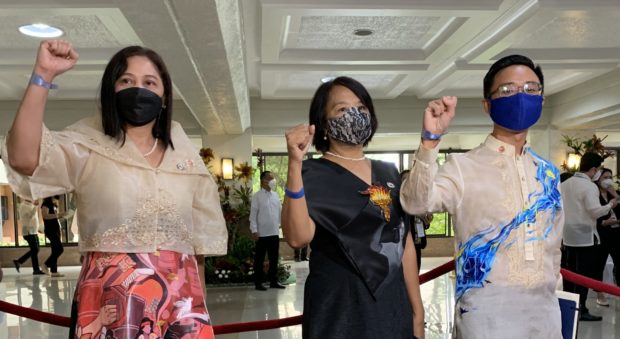Makabayan bloc condemns use of Anti-Terrorism Act vs Teves

Reps. Arlene Brosas (Gabriela), France Castro (ACT Teachers), and Raoul Manuel at (Kabataan) — all members of the House Makabayan bloc — attend the first State of the Nation Address of President Ferdinand Marcos Jr. in July 2022. (FILE PHOTO)
MANILA, Philippines — The Makabayan bloc of lawmakers in the House condemned on Wednesday the government’s use of the Anti-Terrorism Act (ATA) to go after Negros Oriental Rep. Arnolfo Teves Jr.
The state already has enough powers to pursue Teves without using the new law, Makabayan said in a joint statement issued on Wednesday.
The bloc is composed of ACT Teachers party-list Rep. France Castro, Gabriela party-list Rep. Arlene Brosas, and Kabataan party-list Rep. Raoul Manuel.
“The Makabayan bloc strongly condemns the dangerous trend of using the Anti-Terrorism Law as a means to apprehend individuals suspected of committing crimes, as recently suggested in the case of the killing of Gov. Degamo. While we recognize the importance of ensuring justice for victims, it is imperative that we do so within the bounds of due process and respect for human rights,” the bloc said.
“The Marcos Jr. administration already possesses sufficient laws and powers to go after and apprehend Rep. Arnie Teves or any individual responsible for the heinous crime. The invocation of the Anti-Terrorism Law in this context not only attempts to justify its existence but also fails to address the underlying issues surrounding the effective investigation and apprehension of suspects,” the statement added.
Surprise move
In a surprise move on Tuesday morning, the Anti-Terrorism Council, which was created by the Anti-Terrorim Act, branded Teves and his brother, former Negros Oriental Gov. Pryde Henry Teves, along with 11 others, as terrorists.
The council said the declaration against the Teves siblings was issued due to their alleged involvement in the spate of killings in the province, including the assassination of Negros Oriental Gov. Roel Degamo.
The lawmaker denied the accusation, saying that he and his brother would not gain anything by killing Degamo. However, Teves has refused to come home from abroad due to concerns about his safety.
The House had authorized him to make a trip to the United States for medical treatment. But the authorization allowed him to be away from Feb. 27 to March 9.
His continuous absence forced the House Committee on Ethics and Privileges to recommend his suspension twice, both of which were unanimously approved.
Weaponizing the law
Teves’ counsel, Ferdinand Topacio, noted in a media briefing on Tuesday that the law was abused and weaponized against his client, with the goal of freezing the lawmakers’ assets.
Topacio — a supporter of the Anti-Terrorism Act and an outspoken critic of the Makabayan bloc — said that even good laws could be abused if the executive branch was “ruthless” and had “no conscience.”
According to the Makabayan lawmakers, they had tried to inform the Supreme Court about the unilateral power that the law gave to the council, which could easily mark critics as terrorists.
“This approach reveals the incompetence of government bodies in apprehending their suspects and highlights the tendency to use the Anti-Terrorism Law as a crutch. When the Marcos Jr. administration cannot get what it wants from the courts, it goes to the [ATC] — just as it did with four Cordillera activists, namely Windel Bolinget, Stephen Tauli, Jennifer Awingan-Taggaoa and Sarah Abellon-Alikes, whom the ATC unilaterally and arbitrarily labeled as terrorist,” the Makabayan lawmakers said.
“This is what we have been arguing before the Supreme Court before: the unilateral power of the Terror Council to designate will practically deprive the courts of their power to adjudicate, and any citizen of their rights. Resorting to the Anti-Terrorism Law for crime solving undermines the principles of justice and human rights, and risks further eroding public trust in our justice system,” they added.